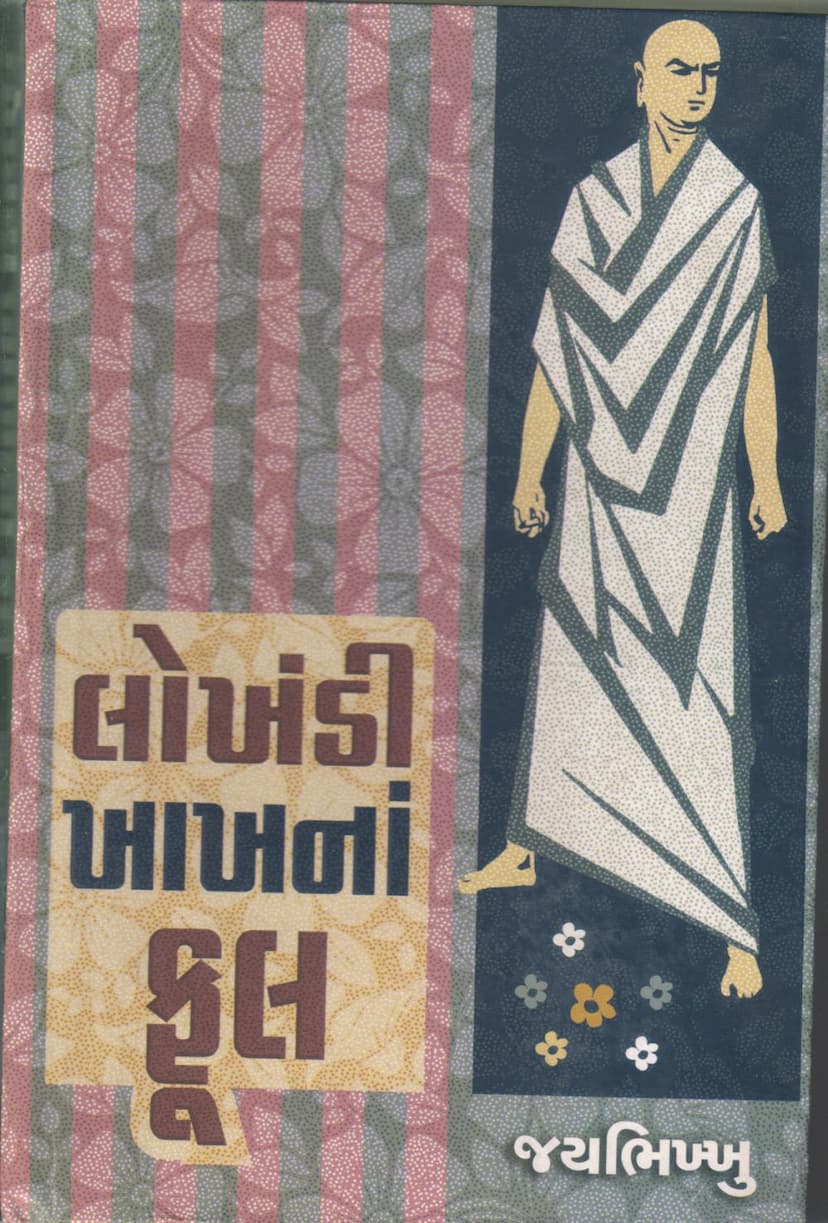Lokhandi Khakhna Ful
Added to library: September 2, 2025

Summary
Here is a comprehensive summary of the Jain text "Lokhandi Khakhna Ful" by Jaibhikkhu, based on the provided pages:
Book Title: Lokhandi Khakhna Ful (Meaning: Flowers of the Iron Flame) Author: Jaibhikkhu Publisher: Shri Jaibhikkhu Sahitya Trust
Overall Summary:
"Lokhandi Khakhna Ful" is a Gujarati historical novel that delves into the life and times of Arya Kalak (also known as Kalakacharya), a prominent Jain monk and scholar who lived approximately two thousand years ago. The novel is set against the backdrop of a society where the teachings of Lord Mahavir and Buddha were fading, and religious practices had become corrupted by superstition, ritualism, and unethical behavior. The narrative focuses on Arya Kalak's struggle to restore the dignity and true essence of religion against an oppressive and immoral ruler, King Gardhabhilla of Ujjain.
Key Themes and Narrative Arc:
- The Corrupted State of Religion: The novel vividly portrays a period when religion, in the name of divine worship, had become intertwined with unrighteous practices. Animal sacrifices, human sacrifices (nar-medh), worship of nude women, alcoholism, and meat consumption were considered legitimate religious acts. This period was characterized by hypocrisy, with irreligion flourishing under the guise of faith.
2s. Arya Kalak: A Lion-like Dharma Warrior: The central figure is Arya Kalak, a Jain monk who embodies courage, wisdom, and unwavering devotion to Jain principles. He renounced a life of luxury as a Kshatriya prince to embrace asceticism. The novel highlights his determination to fight injustice and restore the fallen prestige of religion, even at the cost of his own honor, position, knowledge, and ultimately, his life. His motto, "Karm Shura So Dharma Shura" (One who is brave in action is brave in Dharma), encapsulates his spirit.
-
The Tyranny of King Gardhabhilla: The story revolves around King Gardhabhilla of Ujjain, depicted as an immoral, misguided, and oppressive ruler. His misdeeds, particularly the abduction of Arya Kalak's sister, Saraswati, who had become a Jain nun (sadhvi), served as a direct challenge to Dharma. Gardhabhilla's arrogance and disregard for religious sanctity, human rights, and pleas for justice set the stage for Arya Kalak's intervention.
-
Arya Kalak's Stand Against Injustice: When the king disregards the entreaties of the merchant guild, ministers, and officials, Arya Kalak himself confronts Gardhabhilla. The king's cruel mockery and attempt to attack Arya Kalak with an elephant reveal his depraved nature. Arya Kalak, choosing to live to restore righteousness rather than die for it, vows to bring about the destruction of this unrighteous king.
-
The Call for Dharma and People's Duty: After shedding his monastic robes, Arya Kalak travels across India, urging people and leaders to recognize that a king must uphold noble ideals, love his subjects, and be devoted to Dharma. He emphasizes that any ruler acting contrary to these principles must be removed. However, he finds the people suppressed and unwilling to fight the powerful Gardhabhilla.
-
Seeking Foreign Aid and the Rise of the Shakas: When Indian states fail to act, Arya Kalak seeks help from abroad. He travels to Sindh, where the Shakas had settled and established their rule. Using his wisdom and influence, he wins over the Shaka rulers.
-
The Shaka Intervention and Victory: Fortuitously, the Shaka rulers, who were facing the wrath of the Shaka Emperor for a minor offense, found an opportune moment to follow Arya Kalak's advice to leave their homeland and seek new dominion. Arya Kalak leads them back to India to defeat Gardhabhilla. With Shaka assistance, they conquer Saurashtra and then attack Ujjain. Arya Kalak's strategy and military prowess lead to the defeat and capture of King Gardhabhilla.
-
Justice and Restoration: Arya Kalak, though capable of taking Gardhabhilla's life, chooses to forgive him. He advises the Shaka rulers to govern Avantika (Ujjain) according to Dharma, emphasizing that their rule would last only as long as they upheld Dharma. After restoring order and justice, Arya Kalak, along with his sister Saraswati, returns to his monastic life in the forests.
-
Historical Context and Social Commentary: The novel situates Arya Kalak's story within a broader historical context, describing the political fragmentation of India, the influx of foreign tribes (Huns, Shakas, Yavanas), the rise of luxury and moral decay, and the pervasive religious hypocrisy. It also touches upon the concept of "mantra-tantra" not just as superstition but as a form of science, reflecting the belief systems of the era. The text also includes insights into the educational system of ancient ashrams, where students from various regions pursued knowledge.
-
Jaybhikhkhu's Literary Vision: The book's preface and publisher's notes highlight Jaibhikkhu's significant contribution to Gujarati literature, emphasizing his ability to weave moral and humanitarian messages into his stories, often drawing from Jain narratives but presenting them in a universally appealing manner. The notes also detail the extensive efforts of the Shri Jaibhikkhu Sahitya Trust in promoting his work and legacy, including various literary awards, competitions, and the republication of his books.
In essence, "Lokhandi Khakhna Ful" is a powerful historical novel that uses the life of Arya Kalak to explore themes of righteousness versus tyranny, the corruption and restoration of religious ideals, the strength of conviction, and the impact of individual action in challenging societal decay. The narrative blends historical elements with dramatic storytelling to bring to life a pivotal period and a remarkable spiritual leader.